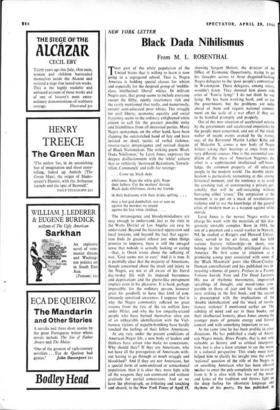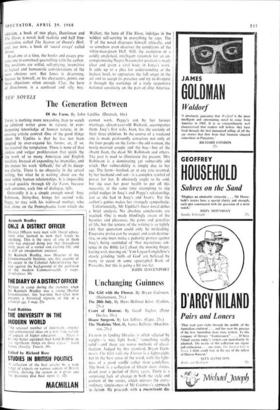NEW YORK LETTER
Black Dada Nihilismus
From M. L. ROSENTHAL
THAT part of the white population of the United States that is willing to learn is now going to a segregated school. That is, Negro America is holding special classes for whites and especially for the despised group of 'middle- class, intellectual, liberal' whites. In militant Negro eyes, that group seems to include everyone except the filthy, openly reactionary rich and the rarely mentioned (but really, and numerously, extant) semi-educated poor whites. The struggle for civil liberty, economic equality and social fraternity seems to the ordinary enlightened white citizen to call for the greatest possible unity and friendliness from all interested parties. Many Negro spokesmen, on the other hand, have been slapping the outstretched hand of late and have insisted on shock tactics of verbal violence, reverse-racist intransigence and revived slogans of Black Nationalism. The striking poem 'Black Dada Nihilismus,' by Leroi Jones, expresses the deepest disillusionment with the 'white' culture that so ruthlessly 'destroyed Byzantium, Tenoch- titlan, Commanch' and calls for revenge:
. . . Come up, black dada nihilismus. Rape the white girls. Rape their fathers. Cut the mothers' throats. Black dada nihilismus, choke my friends in their bedrooms with their drinks spilling. . . .
may a lost god dumballah. rest or save us against the murders we intend against his lost white children. . . .
The intransigence and bloodymindedness are easy enough to understand, just as the riots in the Watts District of Los Angeles are easy to understand. Beyond the historical oppression and local tensions, and beyond the fact that aggres- sion finds its greatest release just when things promise to improve, there is still the enraged sense that nobody is actually looking or caring —that, as Owen wrote about the suffering of war, 'God seems not to care.' And it is true. It is painfully clear that the majority of Americans, though concerned about the insult and injury to the Negro, are not at all aware of his literal day-to-day life with its imposed barrenness and deprivations and the ghetto-like entrapment implicit even in his pleasures. It is hard, perhaps impossible, for the ordinary person, however great his goodwill, to have that kind of con- tinuously sensitised awareness. I suppose that is why the Negro community suffered no great trauma from the fate of the six million Jews under Hitler, and why the few empathy-crazed people who have burned themselves alive out of an unbearable identification with the Viet- namese victims of napalm-bombing have hardly touched the feelings of their fellow Americans.
At any rate, under the present conditions of American Negro life, a new body of leaders and thinkers have arisen who make no concessions. Why should they? If they are Americans, why not have all the prerogatives of Americans with- out having to go through so much struggle and bloodshed? And if they are not Americans, but a special form of semi-enslaved or semicolonial population, then it is clear they must fight with all the weapons they can command and without gratitude for partial concessions. And so we have the photograph, so irritating and touching and absurd, in the New York Times of April 15,
showing Sargent Shriver, the director of the Office of Economic Opportunity, trying to get his thoughts across to three disgusted-looking Negro delegates to the 'poor people's convention' in Washington. These delegates, among others, wouldn't listen. They shouted him down with cries of 'You're lying!' I do not think he was lying. He has been working hard, and so has the government, but the problems are miles ahead of them and require national commit- ment on the scale of a war effort if they are to be handled promptly and properly.
Out of this new situation of accelerated activity by the government and accelerated impatience by the people most concerned, and out of the whole welter of recent events evoked by the names, say, of the Reverend Martin Luther King and of Malcolm X, comes a new body of Negro writers taking their bearings at once from two very different sources. One is the existential con- dition of the mass of American Negroes; the other is a sophisticated intellectual self-know- ledge, the common property of all educated people in the modern world. The double identi- fication is particularly tormenting at this stormy historical moment, and the tendency is to avoid the crushing task of constructing a private per- sonality that will be self-sustaining without betraying either 'cause.' The temptation at the moment is to put on a mask of revolutionary violence and to use the knowledge of the general crisis of modern man as a weapon against white morale.
Leroi Jones is the newest Negro writer to charge his work with the materials of this dan- gerously unstable complex. Born in 1934, the son of a postman and a social worker in Newark, NJ, he studied at Rutgers and Howard Univer- sities, served in the air force, and has held various literary fellowships—in short, now belongs to the intellectually privileged class in America. He first came to attention as a promising young poet associated with some of the 'Black Mountain' poets (the Olson-Creeley- Duncan constellation) and has published two in- teresting volumes of poetry, Preface to a Twenty Volume Suicide Note and The Dead Lecturer. His use of rhythmic movements, improvised spirallings of thought, and mood-tones corn- ' parable to those of jazz and his sardonic wit were striking in the first book, and the second is preoccupied with the implications of the 'double identification' and the 'mask of revolu- tionary violence' I mentioned earlier on. The subtlety of mind and ear in these books, and their intellectual honesty, place Jones among the younger poets of genuine energy and formal control and with something important to say. At the same time he has been prolific in other directions. He has published a study of Ameri- can Negro music, Blues People, that is not only valuable as history and as critical interpreta- tion, but is also a keen attempt to see the music in a cultural perspective. This study must have helped him to clarify his insight into the whole 'national' question of the role of the Negro as an unwilling American who has been allowed neither to enter the pale completely nor to escape from it. It is alive with the love of the music and lyrics of the tradition and throws light on the deep feeling for idiomatic language and rhythriis of his poetry. He has published, in
addition, a book of two plays, Dutchman and The Slave; a novel, half realistic and half free- associative, called The System of Dantes Hell; and, just now, a book of 'social essays' called Home.
Read one at a time, the books and essays pro- voke one to continual quarrelling with the author. The positions are wilful, self-pitying, insensitive to logical and humanistic considerations of the most obvious sort. But Jones is disarming, because he himself, or his characters, points out these objections often enough. Clay, the hero of Dutchman, is a confused and silly boy. Walker, the hero of The Slave, indulges in the wildest self-serving in everything he says. The 'I' of the novel disgraces himself ethically, and so somehow even deserves the conditions of the white-man-given Hell. Still, the evolution of a coldly analytical, intelligent rationale for an un- compromising Negro Nationalist position is made clear and given a vital body in Jones's work. It adds up to a plea for understanding at the highest level, to appreciate the full anger in the air and to accept its presence and try to dissipate it through the workings of a truly responsive national sensitivity on the part of elite America.











































 Previous page
Previous page